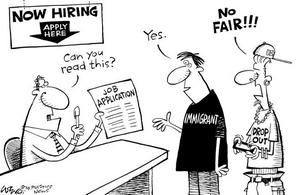By Bill Bregar
SENIOR STAFF REPORTER
Published: January 14, 2014 2:55 pm ET
Updated: January 14, 2014 2:57 pm ET

Image By: Rich Williams
As 2014 begins, all you're hearing about is Obamacare, but immigration reform will get some attention. Economics is a big reason: The United States has a skilled worker shortage. And immigrants bring an entrepreneurial energy with them. They start businesses.
They work hard, even at basic factory jobs. At countless plastics factories I've visited, I always hear managers praise their new employees from places like Vietnam or Bosnia. And more countries are pumping out good engineers, India-style.
Just look at the faces of those kids who get to the finals in the National Spelling Bee.
I'm now working out of a home office east of Cleveland, and the newspapers report stories quoting owners of local nurseries that say Mexicans work faster and harder than Americans — if they could even get Americans to apply for those jobs, and stay for more than a few days before they quit.
Now U.S. manufacturing seems on the verge of a renaissance? But now it's clear — more clear than ever before — that the lack of skilled workers could constrain economic growth.
And so you're finally hearing politicians — even ones who maybe wanted to build that wall along the Mexican border — admitting that immigration really is linked to our ability to grow as a nation. And that it's time for reform.
A lack of H-1B visas can force U.S. companies to outsource jobs to people from other countries who are skilled in math and science. College graduates often feel they have to return home, even if they would like to stay here.
For sure, U.S. factories are busy. According to the Institute for Supply Management, American manufacturers ended last year with the most new orders since 2010.
Manufacturing expanded for the last seven consecutive months of 2013.
Things look good for the U.S. plastics industry. On my machinery beat, executives are pleased with demand, not just for another injection press, but for advanced, new technology.
So while the plastics industry bemoans the skilled worker shortage, don't forget about what will take to change that — a sustained, long-term effort to boost vocational education in the United States and make some changes in our immigration policies.
Progressive plastics manufacturers already spend money on training, and some even hold classes for English as a second language. These are sound investments. They make society better.
Unfortunately, a lot of business executives just complain. And the government? How disappointing. Is it possible for the United States to tackle long-term issues anymore? (Don't think too much about this question, it'll ruin your New Year.)
But immigration reform has a chance. It's the right thing to do, yes, but the real reason is simple economics.
Bill Bregar is a senior reporter for Plastics News. | 